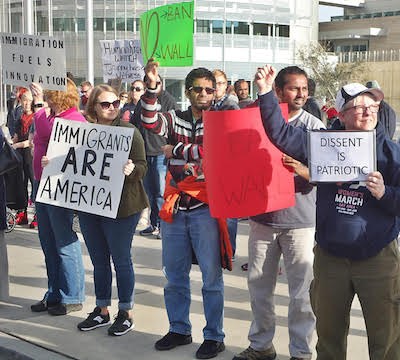Magazine, Immigration, Making Money, Chron, By Ilene Bassler

Janette Marx, CEO AirSwift, Photo: AirSwift
Tighter immigration policies are becoming a new hurdle in the global race for talent.
Janette Marx, who runs a global workforce solutions company with a hub in Houston, spoke with the Houston Chronicle about global trends in hiring.
Marx recently has been named CEO of Airswift after serving as the company’s COO. Airswift has more than 35 years in the business.
Q. What does Airswift do?
A. We hire and recruit engineers and technical personnel and put them to work all over the world in the energy, process and infrastructure industries. Here in Houston, of course, we’re heavily involved in the energy sector.
Our various business segments include consultancy services, talent acquisition services, global mobility, and managed solutions. Our Managed Solutions subsidiary, for example, addresses complex workforce organization processes such as mobilization of multi-discipline teams and supply-chain management integration.
Beyond just hiring people for projects in numerous countries, we often handle immigration paperwork, visas, flights, housing, and other details such as helping employees find where to shop and where to bank in their new location. Our Global Employment Outsourcing division manages other companies’ full-time employees working in foreign countries. We can tailor our solutions to match any situation.
Q. How are trends in immigration policies affecting your business?
A. The push for nationalization is one of the biggest macro-trends I’ve been watching. It’s not just in the US, but in many other countries. As countries focus on nationalization, they are looking for local talent and making sure that companies are hiring enough of their own citizens. This trend is impacting so much when it comes to how we share talent around the world. Certain countries set quotas for each company — how many locals they hire vs. how many expats.
When a company decides to go into a specific country, they really have to assess the talent that is already there as well as who they can hire to deliver whatever is needed.
Immigration policies impact different industries differently, based on the type of skill set needed. In the energy industry, for example, we see a lot of highly talented engineers and highly skilled people that our company would bring in for various parts of a project. We may plan a project here in Houston, for example, and then build it elsewhere. Each step of the process may be done in different locations. Being able to bring talent in and out for a project that may touch many countries is very important.
Q. Is this nationalization trend problematic?
A. It comes with pros and cons. It’s good to train people in different countries so they can build up their skills. It could be a negative for countries if the people don’t have baseline skills needed for upscaling. Bringing in the right talent from outside could help jump start their economies.
Q. Are you able to shift locations for certain work to get around restrictions?
A. It’s not that easy, but it’s part of preplanning. For companies considering where to do their work, a country’s immigration policies and local talent are key factors. They look at overall cost, timing and type of talent they have to pull from. Lack of talent puts a country at a disadvantage.
Q. Are you worried about ongoing trade hostilities?
A. We live in a more global economy now more than ever. Just the way we can get around the world, the way we work with other countries – we’ve really globalized our economy across so many different industries. Countries need to be able rely on each other for the different goods and services that they produce and sell. So, I hope we can continue to understand and appreciate differences in culture, and also know how to work together. That’s key to how everyone can grow.
Q. How is business in the energy sector?
A. After four tough years, business in the energy sector is on an upswing. We’re seeing robust growth and more projects are getting approved for final investment decisions. In Houston and throughout the US, the shale market is quite busy. Worldwide, we’re starting to see a pick-up in different sectors, but Houston and the US are really doing well. We’re also seeing a lot of growth in the Middle East. It’s a positive story right now.
Q. What are the biggest threats to Houston’s economy and the US and world economies?
A. A big threat to the Houston economy – and macro too – is the uncertainty about the price of oil. So many factors can impact the price of oil.
A bigger threat to the overall world economy is the skill gap. As we grow, we need new skills to fill different roles for projects as well as just regular day-to-day business. The skill gap is coming back into the energy world once again. It’s already being felt in the US.
Read complete interview on Chron.com






